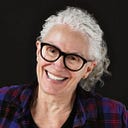Alternative schools: We need your help!
If your school is educating students in a way that preserves their love of learning while building robust, useable, and embodied knowledge, my colleagues and I want to show off your accomplishments. In other words, we want to prove that your way of educating works better than conventional schooling.
We know this is a big ask. We’ve learned the hard way that most of you, along with the parents of children you teach, don’t trust standardized assessment in any form. This is something I fully understand. The onset of the high stakes testing phenomenon is exactly what led me to undertake the challenge of creating an alternative way of doing assessment that supports the kind of learning you value.
In fact, it’s almost 25 years since I made the decision to reinvent educational testing from the ground up, changing the focus from correctness to skillful real-world application in environments that support the development of the whole child. Lectica’s mission is to create tools that help all K-12 teachers provide the kind of learning experience your school provides. We want students everywhere to retain their love of learning, see themselves as learners, and build skills for learning optimally.
Our assessments, which are radically formative, are built upon a learning model and method called VCoL+7. Their creation involves a great deal of research into how learning works in general, and how specific knowledge and skills develop in particular.
Lectical Assessments have been used in a wide range of settings around the English speaking world. But there is one community we haven’t been able to serve as much as we would like—yours. So, here are a few things that might convince you to contact us for more information.
We have a lot to offer
First, we can show off your superior performance. Because our assessments measure the kind of learning you support, they can provide empirical evidence for what you already know—your students are learning more robustly than students in conventional schools.
Second, our reports can help you personalize learning even further. They do this by (1) showing how students are growing, and (2) including personalized learning activities that help students build deep understanding and skill. To get a sense of what I mean, take a look at the report card below, which shows a student’s growth over time. This report card makes it possible to detect not only growth, but also variations in performance. Some variation in performance is completely normal, but some may be due to changes in instructional strategies or teachers, and some may be due to life events. By tracking development over time, we get a sense of what is normal for a particular child as well as a record of the impact of efforts to support that child’s learning.
BTW: The LRJA is an assessment of reflective judgment (similar to critical thinking, but broader), and the LDMA is an assessment of decision-making that is focused on VUCA skills. Both assessments focus on +7 skills from the model shown above.
The next image, below, is an example of the individual report a student would receive after taking one of our assessments. (Actually, the report shown is one of several that would be available, each representing a different targeted skill area.) The report provides recommendations for several practices in the “What’s next” section and provides a VCoL activity that relates to the first suggested practice.
You may have noted that neither the report card nor the individual report contains actual scores. This is an intentional and recommended practice.
Third, our scores can be used both formatively and summatively. Most formative assessments are not reliable enough for summative use, but Lectical Assessments are different. The statistical reliability of individual scores is high enough for many summative uses, and the statistical reliability of reports card showing growth over time approaches perfect reliability.
The ask
My colleagues and I want to show the world what a difference it makes to educate students in a way that preserves their love of learning while building robust, useable, and embodied knowledge. To do this, we need to measure the skills of students attending schools that support this kind of learning. You can help by giving Lectical Assessments a try. If you represent an alternative school and I’ve piqued your curiosity, please contact us. I’d love to chat.
.
